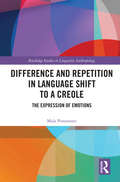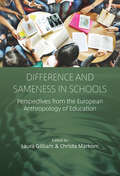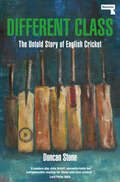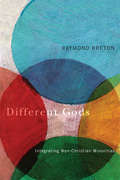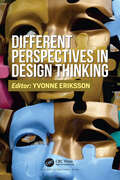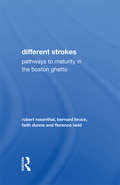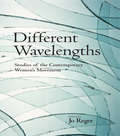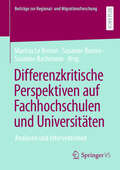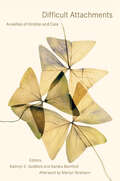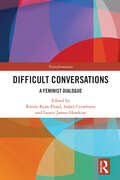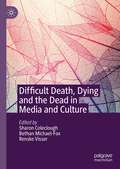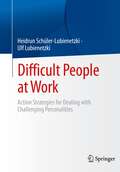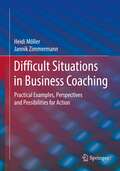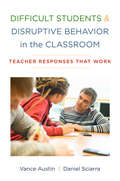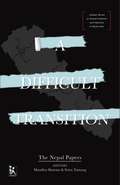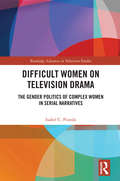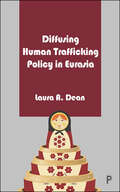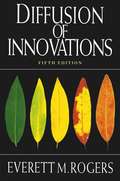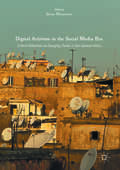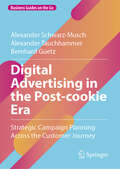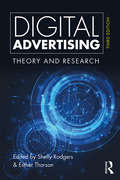- Table View
- List View
Difference and Repetition in Language Shift to a Creole: The Expression of Emotions (Routledge Studies in Linguistic Anthropology)
by Maïa PonsonnetIn today’s global commerce and communication, linguistic diversity is in steady decline across the world as speakers of smaller languages adopt dominant forms. While this phenomenon, known as ‘language shift’, is usually regarded as a loss, this book adopts a different angle and addresses the following questions: What difference does using a new language make to the way speakers communicate in everyday life? Can the grammatical and lexical architectures of individual languages influence what speakers express? In other words, to what extent does adopting a new language alter speakers’ day-to-day communication practices, and in turn, perhaps, their social life and world views? To answer these questions, this book studies the expression of emotions in two languages on each side of a shift: Kriol, an English-based creole spoken in northern Australia, and Dalabon (Gunwinyguan, non-Pama-Nyungan), an Australian Aboriginal language that is being replaced by Kriol. This volume is the first to explore the influence of the formal properties of language on the expression of emotions, as well as the first description of the linguistic encoding of emotions in a creole language. The cross-disciplinary approach will appeal to linguists, psychologists, anthropologists and other social scientists.
Difference and Sameness in Schools: Perspectives from the European Anthropology of Education (EASA Series #48)
by Laura Gilliam and Christa MarkomPresenting European Anthropology of Education through eleven studies of European schools, this volume explores the constructing and handling of difference and sameness in the central institutions of schools. Based on ethnographic studies of schools in Greece, England, Norway, Italy, Switzerland, the Czech Republic, Spain, Austria, Russia, Germany, the Netherlands and Denmark, it illustrates how anthropological studies of schools provide a window to larger society. It thus offers insights into cultural lessons taught to children through policies, institutional structures and everyday interactions, as well as into schools’ entanglement in state projects, cultural processes, societal histories and conflicts, and hence into contemporary Europe.
Different Class: The Untold Story of English Cricket
by Duncan StoneIn telling the story of cricket from the bottom up, Different Class demonstrates how the "quintessentially English" game has done more to divide, rather than unite, the English.In 1963, the West Indian Marxist C.L.R. James posed the deceptively benign question: "What do they know of cricket, who only cricket know?"A challenge to the public to re-consider cricket and its meaning by placing the game in its true social, political and economic context, James was, all too subtly, attempting to counter the game&’s orthodox history that, he argued, had played a key role in the formation of national culture. As a consequence, he failed, and the history of cricket in England has retained the same stresses and lineaments as it did a century ago — until now.In examining recreational rather than professional (first-class) cricket, Different Class does not simply challenge the widely accepted orthodoxy of English cricket, it demonstrates how the values and belief systems at its heart were, under the guise of amateurism, intentionally developed in order to divide the English along class lines at every level of the game. If the creation of opposing class-based cricket cultures in the North and South of England grew out of this process, the institutional structures developed by those in charge of English cricket continue to discriminate. But, as much as the exclusion of Black and South Asian cricketers from the recreational mainstream is the most obvious example, it is social class that remains the greatest barrier to participation in what used to be the national game.
Different Gods
by Raymond BretonIn recent decades the ebb and flow of immigration to Canada has changed significantly, with the majority of immigrants coming from non-European countries. A striking feature of this shift is that a significant proportion of immigrants are non-Christians newly immersed in a society entrenched in Christian ideals. In Different Gods, Raymond Breton looks at the significance of religious differences and what they mean for immigrants, non-immigrants, and Canada's future. Breton examines the evolution over time of the religious attitudes and behaviour of the new minorities and the challenges that their presence poses to the receiving society. The analysis consists of a review of recent research and formulates possible conclusions about the transformations that integration may bring about for both the minorities and the receiving society. An important analysis of immigration in an era of rapidly changing social values, Different Gods looks boldly into issues of collective identity and cultural accommodation.
Different Gods: Integrating Non-Christian Minorities into a Primarily Christian Society
by Raymond BretonIn recent decades the ebb and flow of immigration to Canada has changed significantly, with the majority of immigrants coming from non-European countries. A striking feature of this shift is that a significant proportion of immigrants are non-Christians newly immersed in a society entrenched in Christian ideals. In Different Gods, Raymond Breton looks at the significance of religious differences and what they mean for immigrants, non-immigrants, and Canada's future. Breton examines the evolution over time of the religious attitudes and behaviour of the new minorities and the challenges that their presence poses to the receiving society. The analysis consists of a review of recent research and formulates possible conclusions about the transformations that integration may bring about for both the minorities and the receiving society. An important analysis of immigration in an era of rapidly changing social values, Different Gods looks boldly into issues of collective identity and cultural accommodation.
Different Perspectives in Design Thinking
by Yvonne ErikssonGlobalization and digitalization are buzz words in contemporary society. They affect both our private and our professional lives. Society has become more diverse with easier access to information and to virtual platforms that gives us opportunity to be in touch with colleagues, friends, family, etc. at any time. A complex environment is emerging wherein internet of things and big data are being integrated with products, production systems, healthcare, and daily activity and play an important part in decision making. This has an impact on future designs and the role of designers. Responsible designers with a holistic perspective are needed.The book highlights several aspects of design thinking such as Information Design and Critical Design. The meaning of culture, gender and disabilities are also discussed. The functions of Information Design are changing from ‘showing the way’, instruction manuals and graphic design. It will affect among others, healthcare technology, smart products and Industry 4.0. Design thinking perspective that includes users from the entire chain and from the producer to the end user of the product or service, is needed. This will also require gender and culture issues to be taken into consideration in designing products and services. Design thinking methods and critical aspects of design will contribute to an inclusive society.
Different Strokes: Pathways to Maturity in the Boston Ghetto
by Robert RosenthalThis book describes the Pathways project that traces the individual development of several black young men from poor families who grew up in the Roxbury/North Dorchester ghetto from 1967 to 1974. It is about aspects of self-perception and identity, and resources and pathways to reach goals.
Different Wavelengths: Studies of the Contemporary Women's Movement
by Jo RegerThe original essays in this collection ground the shifting terrain of feminism in the 21st century. The contributors define and examine the complexity of the Third Wave by answering questions like: how appropriate is a "third wave" label for contemporary feminism; are the agendas of contemporary feminism and the "second wave" really all that different; does the wave metaphor accurately describe the difference between contemporary feminists and their predecessors; how do women of color fit into this notion of contemporary feminism; and what are the future directions of the feminist movement?
Differenz im Raum: Sozialstruktur und Grenzziehung in deutschen Städten
by Hanno Kruse Janna TeltemannSoziale Grenzziehungen prägen das Zusammenleben in Städten. Wie diese Einsicht in der quantitativen Stadtsoziologie berücksichtigt werden kann, thematisiert dieser Sammelband. Beispielhaft vermitteln dessen Beiträge die Bedeutung von gruppen- und raumbezogener Kategorisierung für die Analyse räumlicher Sozialstruktur. Anhand verschiedener empirischer Studien zu Ausmaß, Ursachen und Konsequenzen von Segregation und räumlicher Ungleichheit liefern sie gleichzeitig eine Bestandsaufnahme räumlicher Differenz in Deutschland.
Differenzierung im Wirtschaftsunterricht: Eine qualitative Delphi-Studie zu Chancen und Hürden
by Christoph HertrichChristoph Hertrich untersucht in dieser Studie die Chancen und Hürden einer Differenzierung im Wirtschaftsunterricht. Auf Basis einer Delphi-Experten-Befragung identifiziert er domänenspezifische und überfachliche Aspekte, die bei der Konzeption von differenzierenden Lehr-Lernarrangements berücksichtigt werden sollten. Damit wird ein zentraler Beitrag zur Unterrichtsforschung im Bereich der ökonomischen Bildung geleistet, der zugleich wertvolle Impulse für die Praxis liefert.
Differenzkritische Perspektiven auf Fachhochschulen und Universitäten: Analysen und Interventionen (Beiträge zur Regional- und Migrationsforschung)
by Susanne Bachmann Maritza Le Breton Susanne BurrenZiel dieses Sammelbands ist es, historisch-theoretische, empirische und handlungsbezogene Zugänge zu Differenzkonstruktionen und (Un-)Gleichheiten sowie Diversitätsorientierung an (Fach-)Hochschulen und deren bildungspraktische Relevanz und Spannungsfelder aus kritisch-dekonstruktiver, postkolonialer und intersektionaler Perspektive zu beleuchten - dies mit Bezug auf aktuelle Diskurse über Diversität im Hochschulkontext, die eher an Ansätze der betriebswirtschaftlichen Organisationsentwicklung ausgerichtet sind. So kann Diversity-Management unter Beachtung hochschulinterner Diversitätsleitsätze soziale Positionierungen festschreiben, wodurch eine Re-Essentialisierung stattfinden kann. Eine Betrachtungsweise im Sinne einer kritischen, emanzipatorischen und antidiskriminierenden Perspektive, welche soziokulturelle Bedingungen von Studierenden und Mitarbeitenden an (Fach-)Hochschulen berücksichtigt, ist hingegen selten anzutreffen. Im Fokus alternativer Ansätze steht eine differenzreflexive Hochschule, welche auf die Dekonstruktion von natürlich erscheinenden Differenzlinien zielt, mit der Absicht, nicht nur essentialistische Diskurse zu hinterfragen, sondern auch eine Veränderung der darin eingebundenen geschlechts-, disziplin- und generationenspezifischen Habitusformen zu bewirken.
Difficult Attachments: Anxieties of Kinship and Care
by Marilyn Strathern Sandra Bamford Michael Lambek Jason Danely Deborah A. Boehm Danilyn Rutherford Katie Kilroy-Marac Julia Kowalski Kathryn E. Goldfarb Janelle S. Taylor Celeste Pang Noa Vaisman Erika Finestone Dawa Lokyitsang Riché J. Barnes Patrick McKenzie Brady G’Sell Sonia Yuhui ZhangAnthropologists have long considered kinship as the basis for social solidarity. Indeed, the idea that kinship is grounded in positive sociality has found its way into most anthropological accounts and has served as an orienting framework directing decades of scholarly research. But what about when it is not? What about instances when kinship is anything but ‘warm and fuzzy’ but is characterized, instead, by neglect, violence, negative affect, or a lack of nurturance and care? In the three interlinked sections of this volume, the view that kinship is about “solidarity” and “care” is challenged by exploring how kin relations are not only about connection and inclusion but also about disconnection, exclusion, neglect, and violence. Kinship relationships that feel “positive” and “good” take a great deal of perseverance and work; there is nothing “natural” about kinship ties as being based on positive sociality. In these chapters, the contributors take seriously the contingency of kinship relations (the moments when kinship breaks down or is a source of suffering) and how this prompts scholars to develop new theoretical and methodological perspectives.
Difficult Conversations: A Feminist Dialogue (Transformations)
by Isabel Crowhurst Róisín Ryan-Flood Laurie James-HawkinsThis book explores ‘difficult conversations’ in feminist theory as an integral part of social and theoretical transformations. Focusing on intersectionality within feminist theory, the book critically addresses questions of power and difference as a central feminist concern. It presents ethical, political, social, and emotional dilemmas while negotiating difficult conversations, particularly in terms of sexuality, class, ‘race’, ethnicity and cross-identification between the researcher and researched. Topics covered include challenging cultural relativism; queer marginalisation; research and affect; and feminism and the digital realm. This book is aimed primarily at students, lecturers and researchers interested in epistemology, research methodology, gender, identity, and social theory. The interdisciplinary nature of the book is aimed at reaching the broadest possible audience, including those engaged with feminist theory, anthropology, social policy, sociology, psychology and geography.
Difficult Death, Dying and the Dead in Media and Culture
by Sharon Coleclough Bethan Michael-Fox Renske VisserThis book responds to a growing interest in death, dying and the dead within and beyond the field of death studies. The collection defines an understanding of ‘difficult death’ and examines the differences between death, dying and the dead, as well as exploring the ethical challenges of researching death in mediated form. The collection is attendant to the ways in which difficult deaths are imbricated in power structures both before and after they become mediatised in culture. As such, the work navigates the many political and social complexities and inequalities – what might be deemed the difficulties – of death, dying and the dead. The book seeks to expand understandings of the difficulty of death in media and culture through a wide range of chapters from different contexts focused on literature, film, television, and in online environments, as well as several chapters examining news reportage of difficult deaths.
Difficult People at Work: Action Strategies for Dealing with Challenging Personalities
by Heidrun Schüler-Lubienetzki Ulf LubienetzkiThis book helps professionals deal with difficult or even dangerous colleagues, employees or superiors. Some people poison the working atmosphere, make other people ill and cost their companies a lot of money. Often the cause lies in a psychological disorder, we are then often dealing with narcissists or psychopaths, but usually the destructive behavior is not (yet) based on a psychological disorder. This book introduces a collective term for such people - it calls them "toxic people" - and helps both those affected and those responsible in companies and organizations to recognize them, to protect themselves and others from them, and to take promising action against them. In addition to information on the typical characteristics of "toxic people," their motives are explained and concrete strategies for action and examples of tried-and-tested assistance are provided. A new chapter provides vivid, exciting case studies from real-life situations. A book for managers and those affected as well as personnel developers, trainers, consultants and coaches in companies and organizations.This book is a translation of the original German 2nd edition Schwierige Menschen am Arbeitsplat by Heidrun Schüler-Lubienetzki and Ulf Lubienetzki, published by Springer-Verlag GmbH Germany, part of Springer Nature in 2017. The translation was done with the help of artificial intelligence (machine translation by the service DeepL.com). A subsequent human revision was done primarily in terms of content, so that the book will read stylistically differently from a conventional translation. Springer Nature works continuously to further the development of tools for the production of books and on the related technologies to support the authors.
Difficult Situations in Business Coaching: Practical Examples, Perspectives and Possibilities for Action
by Heidi Möller Jannik ZimmermannCoaches encounter a range of situations in their professional practice that they experience as difficult. The challenges have different sources. They can come from the coaches themselves, the coachees or the commissioning organization. But how do these situations present themselves in detail? How can coaches understand them and respond appropriately? Using real case studies collected online, this book takes a closer look at difficult situations. In doing so, renowned coaches present for discussion their theoretical and methodological perspectives and their recommendations for action. This book is a translation of the original German 1st edition Schwierige Situationen im Business-Coaching by Heidi Möller and Jannik Zimmermann, published by Springer Fachmedien Wiesbaden GmbH, part of Springer Nature in 2020. The translation was done with the help of artificial intelligence (machine translation by the service DeepL.com). A subsequent human revision was done primarily in terms of content, so that the book will read stylistically differently from a conventional translation. Springer Nature works continuously to further the development of tools for the production of books and on the related technologies to support the authors.
Difficult Students and Disruptive Behavior in the Classroom: Teacher Responses That Work
by Daniel Sciarra Vance AustinAttachment-based strategies for reaching and teaching disruptive, difficult, and emotionally challenged students. Difficult Students and Disruptive Behavior in the Classroom provides skills-based interventions for educators to address the most common problem behaviors encountered in the classroom. Offering not just problem-specific “best practices” but an attachment-based foundation of sound pedagogical principles and strategies for reaching and teaching disruptive, difficult, and emotionally challenged students, it empowers educators to act wisely when problem behaviors occur, improve their relationships with students, and teach with greater success and confidence.
Difficult Transition, A: The Nepal Papers
by Mandira Sharma Seira TamangThe Sexual Violence and Impunity in South Asia research project (coordinated by Zubaan and supported by the International Development Research Centre) brings together, for the first time in the region, a vast body of research on this important - yet silenced - subject. Six country volumes (one each on Bangladesh, Nepal, Pakistan, Sri Lanka, and two on India, as well as two standalone volumes) comprising over fifty research papers and two book-length studies, detail the histories of sexual violence and look at the systemic, institutional, societal, individual and community structures that work together to perpetuate impunity for perpetrators. The essays in this volume focus on Nepal, which though not directly colonized, has not remained immune from the influence of colonialism in its neighbourhood. In addition to home-grown feudal patriarchal structures, the writers in this volume clearly demonstrate that it is the larger colonial and post-colonial context of the subcontinent that has enabled the structuring of inequalities and power relations in ways that today allow for widespread sexual violence and impunity in the country - through legal systems, medical regimes and social institutions.The period after the 1990 democratic movement, the subsequent political transformation in the aftermath of the Maoist insurgency and the writing of the new constitution, has seen an increase in public discussion about sexual violence. The State has brought in a slew of legislation and action plans to address this problem. And yet, impunity for perpetrators remains intact and justice elusive. What are the structures that enable such impunity? What can be done to radically transform these? How must States understand the search for justice for victims and survivors of sexual violence? The essays in this volume attempt to trace a history of sexual violence in Nepal, look at the responses of women's groups and society at large, and suggest how this serious and wide-ranging problem may be addressed
Difficult Women on Television Drama: The Gender Politics Of Complex Women In Serial Narratives (Routledge Advances in Television Studies)
by Isabel C. PinedoDifficult Women on Television Drama analyses select case studies from international TV dramas to examine the unresolved feminist issues they raise or address: equal labor force participation, the demand for sexual pleasure and freedom, opposition to sexual and domestic violence, and the need for intersectional approaches. Drawing on examples from The Killing, Orange is the New Black, Big Little Lies, Wentworth, Outlander, Westworld, Being Mary Jane, Queen Sugar, Vida, and other television dramas with a focus on complex female characters, this book illustrates how female creative control in key production roles (direct authorship) together with industrial imperatives and a conducive cultural context (indirect authorship) are necessary to produce feminist texts. Placed within the larger context of a rise in feminist activism and political participation by women; the growing embrace of a feminist identity; and the ascendance of post-feminism, this book reconsiders the unfinished nature of feminist struggle(s) and suggests the need for a broader sweep of economic change. This book is a must-read for scholars of media and communication studies; television and film studies; cultural studies; American studies; sociology of gender and sexualities; women and gender studies; and international film, media and cinema studies.
Diffusing Human Trafficking Policy in Eurasia
by Laura DeanOffering a perceptive study of the urgent human rights issue of trafficking in persons, this important book analyses the development and effectiveness of public policies across Eurasia. Drawing on multi-method research in the region, Laura A. Dean explores the factors behind anti-trafficking strategies and the role of governments and activists in combating labour and sexual exploitation. She examines the intersection of global strategies and state-by-state approaches, and uses the diffusion of innovation framework to cast new light on the impetus and implementation of different policy typologies. Identifying the strengths, weaknesses, and best practices in human trafficking policies around Eurasia, Dean’s book will appeal to a wide range of students, scholars, practitioners, and policy makers.
Diffusion of Innovations, 5th Edition
by Everett M. RogersNow in its fifth edition, Diffusion of Innovations is a classic work on the spread of new ideas.In this renowned book, Everett M. Rogers, professor and chair of the Department of Communication & Journalism at the University of New Mexico, explains how new ideas spread via communication channels over time. Such innovations are initially perceived as uncertain and even risky. To overcome this uncertainty, most people seek out others like themselves who have already adopted the new idea. Thus the diffusion process consists of a few individuals who first adopt an innovation, then spread the word among their circle of acquaintances--a process which typically takes months or years. But there are exceptions: use of the Internet in the 1990s, for example, may have spread more rapidly than any other innovation in the history of humankind. Furthermore, the Internet is changing the very nature of diffusion by decreasing the importance of physical distance between people. The fifth edition addresses the spread of the Internet, and how it has transformed the way human beings communicate and adopt new ideas.
Dig Your Heels In: Navigate Corporate BS and Build the Company You Deserve
by Joan KuhlJoan Kuhl helps women create a clear vision of what their career path deserves to be and make a convincing business case for equality to their managers and senior leadership. You'll learn strategies for overcoming sexist cultural attitudes about gender and leadership, as well as for dealing with self-limiting behaviors like Imposter's Syndrome (the feeling that you're never good enough despite a track record of success) and the Myth of Meritocracy (the idea that just doing good work is the only way to advance). Because relationships are absolutely crucial, Kuhl describes how to build support networks before you even need them and explains how to get actionable feedback that will help you get to the next level—the kind women rarely are afforded. Case studies, practical exercises, and inspiring stories from Kuhl's work with clients at companies such as Eli Lilly and Company, Goldman Sachs, U.S. Soccer, BlackRock, South Carolina Asphalt Pavement Association and top business schools make this a truly comprehensive guide. It's an indispensable resource for women seeking to build the confidence and conviction to secure the seat at the table they've earned and create a welcoming workplace for everyone.
Digital Activism in the Social Media Era
by Bruce MutsvairoThis book probes the vitality, potentiality and ability of new communication and technological changes to drive online-based civil action across Africa. In a continent booming with mobile innovation and a plethora of social networking sites, the Internet is considered a powerful platform used by pro-democracy activists to negotiate and sometimes push for reform-based political and social changes in Africa. The book discusses and theorizes digital activism within social and geo-political realms, analysing cases such as the #FeesMustFall and #BringBackOurGirls campaigns in South Africa and Nigeria respectively to question the extent to which they have changed the dynamics of digital activism in sub-Saharan Africa. Comparative case study reflections in eight African countries identify and critique digital concepts questioning what impact they have had on the civil society. Cases also explore the African LGBT community as a social movement while discussing opportunities and challenges faced by online activists fighting for LGBT equality. Finally, gender-based activists using digital tools to gain attention and facilitate social changes are also appraised.
Digital Advertising in the Post-cookie Era: Strategic Campaign Planning Across the Customer Journey (Business Guides on the Go)
by Alexander Schwarz-Musch Alexander Tauchhammer Bernhard GuetzThis book explains how companies can successfully plan and implement their online campaigns – even after the end of third-party cookies. Campaigns on social media platforms, in search engines, and through display advertising can still be effective if potential customers are targeted accurately. The authors demonstrate how this can work without cookies: developing a "Minimum Viable Persona" and defining campaign groups along the customer journey play central roles. For each touchpoint on the path to purchase, milestones must be tracked, allowing the effectiveness and efficiency of the measures to be easily verified. A resource for marketing professionals seeking solutions in the post-cookie era to continue reaching their target audiences without waste coverage.
Digital Advertising: Theory and Research (Advances in Consumer Psychology)
by Esther Thorson Shelly RodgersDigital Advertising offers a detailed and current overview of the field that draws on current research and practice by introducing key concepts, models, theories, evaluation practices, conflicts, and issues. With a balance of theory and practice, this book helps provide the tools to evaluate and understand the effects of digital advertising and promotions campaigns. New to this edition is discussion of big data analysis, privacy issues, and social media, as well as thought pieces by leading industry practitioners. This book is ideal for graduate and upper-level undergraduate students, as well as academics and practitioners.
